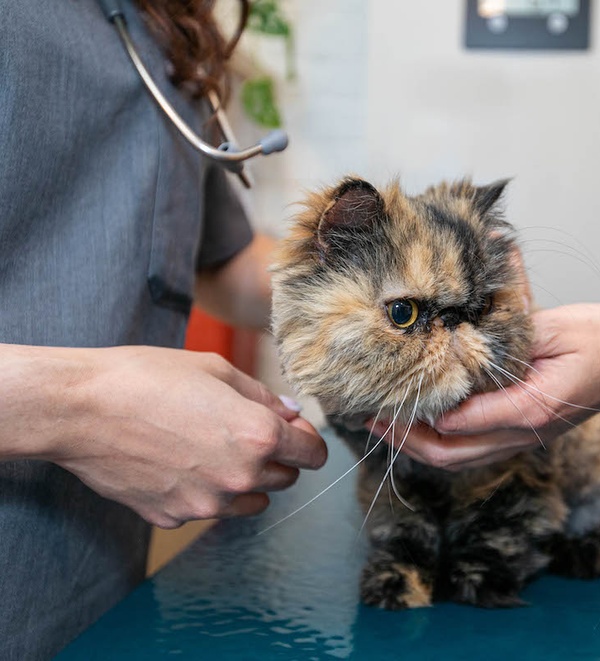
Pancreatitis in Cats: Diagnosis, Treatment, & Recovery
Pancreatitis in Cats: Diagnosis, Treatment, and Recovery
Pancreatitis can occur in any age, breed, or gender of cat, often suddenly and without a known underlying cause. While previously thought to be rare, newer diagnostic tests have revealed that feline pancreatitis is fairly common.
The intensity of the illness is highly variable, with the condition usually classified as either acute (sudden) or chronic (long-term), and as mild or severe. However, it’s always important to seek veterinary care, because pancreatitis can be life-threatening.
What Is Pancreatitis?
The pancreas is an internal organ that sits next to the stomach. It serves two very important functions. The first is producing digestive enzymes that are needed to break down fat, proteins, and carbohydrates. The second is producing hormones like insulin and glucagon, which are crucial for blood sugar regulation.
Pancreatitis refers to inflammation of the pancreas. This happens when digestive enzymes are activated too early, when they’re still inside the pancreas. Normally, these enzymes would pass through the pancreatic duct and into the small intestines, where they safely help with food digestion. But with pancreatitis, the enzymes start to “digest” and damage the pancreas, as well as surrounding tissues like the liver and small intestines.
What Causes Pancreatitis in Cats?
Most of the time, in cats, the cause is unknown.
However, for the times when there is a known cause, it often falls into one of these categories:
- Underlying health conditions, especially inflammatory bowel disease (IBD), liver or gallbladder disease, or diabetes mellitus.
- Trauma, such as being hit by a car or falling from a height.
- Parasites.
- Some infectious diseases.
- Certain toxicities.
- Abnormal reactions to certain medications.
In cats, the liver, pancreas, and portions of the intestines are in close proximity to one another, as are the ducts where pancreatic and liver secretions empty into the small intestine. Therefore, it’s common for pancreatitis to be part of triaditis, or triad disease. This is when all three organs are affected by inflammation, and it’s difficult to tell which came first.
Symptoms of Pancreatitis in Cats
Common signs of pancreatitis in cats include:
- Nausea and vomiting.
- Decreased appetite.
- Diarrhea.
- Fever.
- Lethargy.
- Dehydration.
- Abdominal pain.
- Jaundice (yellowing of the skin, eyes, and mouth) with certain complications.
- In cats with chronic pancreatitis, weight loss over time is common.
Cats with acute pancreatitis tend to be more severely ill. These kitties should be taken to a veterinarian immediately, since the disease can be life-threatening and prompt treatment gives the best chance of recovery.
Chronic pancreatitis, on the other hand, is usually more subtle, with bouts of vague and mild symptoms. It’s still important to seek treatment for these kitties. This typically doesn’t require an emergency visit, but it’s best to schedule as soon as possible.
Diagnosis of Feline Pancreatitis
The symptoms listed above can indicate pancreatitis — but they are also associated with many other health conditions. Therefore, a veterinarian will do a thorough physical exam and recommend diagnostic testing, in order to reach a diagnosis and determine the best course of treatment.
Diagnosing pancreatitis can be tricky. Therefore, veterinarians will often begin treatment based on clinical signs alone. However, diagnostic testing is still important to rule out other health conditions with similar symptoms that could require a different treatment.
Here are some of the most common tests that may be performed:
- Bloodwork, which measures blood cells, blood sugar, electrolytes, and organ function parameters. Unfortunately, bloodwork changes tend to be non-specific (associated with many different diseases, rather than specifically diagnostic for pancreatitis). But bloodwork is still important to rule out other conditions and to check for abnormalities of electrolytes and other parameters that may need to be addressed during treatment. While certain enzymes associated with the pancreas — called amylase and lipase — are often included on a bloodwork panel, they are not clear indicators of pancreatitis in cats because other organs also produce these enzymes. There is a more specific blood test available called feline pancreatic lipase immunoreactivity (fPLI). However, results can take longer than other blood tests, so a vet may need to start treatment while awaiting the fPLI results.
- A fecal exam for parasites.
- Radiographs, which aren’t ideal for viewing the pancreas, but may be needed to rule out surgical conditions such as an intestinal blockage.
- Abdominal ultrasound for evaluating the pancreas for inflammation or other changes.
- Definitive diagnosis of pancreatitis requires a biopsy, obtained through surgery. However, this is often not practical (and may be harmful) for pets that are acutely and severely ill. Therefore, vets usually proceed with treatment for an ill cat without doing a biopsy.
A biopsy may be of more value for kitties who have milder, chronic or recurrent symptoms of pancreatitis.
Feline Pancreatitis Treatment
Treatment of pancreatitis in cats usually requires hospitalization for several days, along with supportive care such as:
- Intravenous fluids to maintain hydration and electrolyte balance.
- Pain medications.
- Medications to help with nausea, vomiting, and diarrhea.
- Anti-inflammatories.
- Nutritional support (more on this below).
- Treatment of concurrent conditions (antibiotics if an infection is present, treatment to regulate diabetes mellitus in cats who have that condition, etc.).
Note: Never give human medications without talking to your vet. Many medications are toxic to cats.
The costs of treatment are variable, depending on how sick a kitty is and whether they need to be hospitalized, as well as whether long-term management is indicated for chronic pancreatitis or concurrent conditions.
Nutritional Support and Dietary Recommendations
Ideally, food would be withheld to stop the production of digestive enzymes. However, fasting in cats is almost never recommended due to the risk of hepatic lipidosis, or fatty liver, a condition that commonly occurs during fasting and can be serious. Therefore, veterinarians usually try to get a cat eating again as soon as possible.
Sometimes, a cat starts eating again on their own, thanks to medications helping them feel better. However, a feeding tube may be needed. While this sounds drastic, a feeding tube can actually be quite comfortable for kitties, and it’s much less stressful than being force fed.
In dogs, ingestion of fatty foods is a well-known cause of pancreatitis. However, for cats — who naturally consume more fat in their diets than either humans or dogs — this association is not so clear. So, it’s usually not necessary to switch a cat to a low-fat diet — although kitties on very high-fat diets might need to change what they eat. Specialty diets designed to help with digestive issues like IBD may be helpful. Your vet can give a recommendation based on your kitty’s unique needs and medical history.
Dietary changes are usually not implemented until the cat is feeling better. Switching food too soon, while a kitty is still sick, could cause aversion to the new diet.
How to Treat Pancreatitis in Cats at Home
Severely ill cats should be treated at a veterinary hospital.
However, for mild or chronic cases, home or outpatient treatment might be possible. Your vet can advise you as to whether or not this is recommended.
Home care for feline pancreatitis usually involves giving medications at home, encouraging your cat to eat, and having fluids administered under the skin (during an outpatient veterinary visit, or by being taught to administer fluids at home).
Recovery and Prognosis
Prognosis depends on a number of different factors. Many cats make a full recovery with timely treatment, while others may pass away, especially if their illness is severe.
As a general guideline, the prognosis is better for cats with milder symptoms, who receive prompt veterinary care and respond well to their initial treatment.
Chronic Pancreatitis
Some (not all) cats develop chronic pancreatitis after they recover from an acute episode. They can have flare-ups over the long-term, although symptoms are generally milder than with acute pancreatitis.
For kitties with chronic pancreatitis, long-term management is important. Your vet can create a plan for management, which may include a diet change, medications, supplements, monitoring (at home and at veterinary checkups), and treatment for flare-ups.
Complications of Pancreatitis
Damage to the pancreas can interfere with future functioning of the organ. For this reason, some kitties develop diabetes mellitus, due to imparied insulin production. These cats usually require daily insulin injections.
Another potential complication is exocrine pancreatic insufficiency. This means there is insufficient production of pancreatic digestive enzymes, which results in inefficient digestion, weight loss, loose stools, and inability to absorb all the nutrients from food. Fortunately, this condition can be treated with supplementation of these digestive enzymes.
As you can see, the nature and long-term consequences of pancreatitis are variable from cat to cat. So, it’s always important to talk to your vet for personalized recommendations.
While pancreatitis is a serious condition, many kitties recover just fine with prompt treatment. And proper management can help many cats with chronic pancreatitis enjoy a great quality of life for years to come.
About the Author
